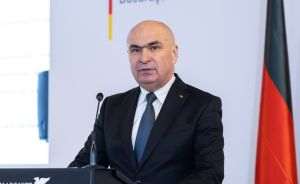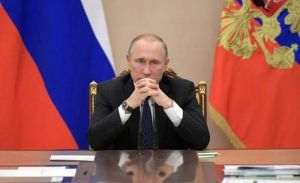The decision that the US and the UK would take today on granting permission to Ukraine to use long-range missiles to hit military targets located on the territory of the Russian Federation brought back the nuclear threats to the states in the speeches of experts in Moscow NATO and the need for a rapid change in nuclear doctrine.
Sergei Karaganov, former presidential advisor to Boris Yeltsin and Vladimir Putin, honorary president of the Russian think tank Council for Foreign and Defense Policy, stated yesterday in an interview given to the Russian publication Kommersant that the time has come for Russia to respond with a nuclear strike.
Sergey Karaganov specified for the quoted source: "The time has come to declare that we have the right to respond to any massive attacks on our territory with a nuclear strike. This also applies to any confiscation of our territory. The Europeans have completely lost their minds, they do not understand what they are doing and have forgotten what war is. (...) I understand that the decision to use nuclear weapons, which will inevitably lead to the death of innocent people, is a terrible step. But having nuclear weapons and failing to convince your adversary of their willingness to use them is suicide. The claim that any limited use of nuclear weapons will necessarily lead to general nuclear Armageddon does not stand up to criticism. I assure you that all nuclear powers have plans for the moderate use of nuclear weapons in certain scenarios."
• The Bundestag - one of the Kremlin's possible targets
The former Russian presidential adviser argues that at the same time it is necessary to introduce the concept of "nuclear escalation" so that a moderate nuclear attack would be preceded by other actions that would convince an enemy that the Russian Federation is ready to use its nuclear arsenal.
Karaganov said: "Our opponents must know that our president will make this decision to launch a nuclear attack. Or will transfer the right to use these weapons to someone else. (...) If the enemy understands this availability, then almost certainly no more drones will be sent over the Kremlin. If a drone flies into the Kremlin again, then why not launch a conventional missile at the Reichstag (ed. - Bundestag) first? Let it burn. If the Germans have forgotten their heinous crimes, which should never be forgotten, they should be reminded of this. In any case, nuclear strikes must be preceded by non-nuclear preemptive strikes. (...) According to the theory of escalation, we have to go about 10-15 steps before nuclear strikes; I've only done five so far. But then it will obviously be necessary to hit targets on the territory of NATO countries, which play an important role in supplying the Kiev regime. If that doesn't stop them, then we move on. He provokes us with a massive conventional weapons attack, we respond with an even more massive non-nuclear group strike, and at some point we are approaching the last steps. Then we must immediately respond with a cluster nuclear strike on targets in Europe."
• The British and American authorities seem determined to respond positively to the requests received from Kiev
The delivery of Iranian missiles to Russia has changed the debate over Ukraine's use of Western-supplied long-range missiles against targets inside Russia, British Foreign Secretary David Lammy told the BBC during a visit to Kiev on Wednesday. Lammy traveled to the Ukrainian capital with US Secretary of State Antony Blinken, as the two discussed the terms of using Western-supplied weapons with President Volodymyr Zelenskiy.
So far the US and Britain have not given Ukraine permission to use long-range missiles against targets inside Russia for fear of escalating the conflict. However, two days ago in Kiev, Antony Blinken said that US President Joe Biden will discuss the use of long-range missiles with British Prime Minister Keir Starmer at the White House on Friday.
Asked about the risk of escalation, the US secretary of state added: "We have now seen this action by Russia acquiring ballistic missiles from Iran, which will increase the power of their aggression in Ukraine. So if anyone is taking escalating measures, it is Mr. Putin and Russia."
The quoted source shows that the minister, David Lammy, although he did not say anything about the possibility that the US and the UK would allow Ukraine to use the long-range missiles sent by the two states to the authorities in Kiev, said: "I am not prepared to I offer an advantage to Putin". Lammy told the BBC that Iran supplying Russia with ballistic missiles "clearly changes the debate" because they would allow Moscow's forces "to push further into Ukraine".
"It is very dangerous," Lammy said, adding: "As we see the Russians working with their partners, we see this transfer of ballistic missiles from Iran to Russia; therefore it is important that we do more to support Ukraine in its quest for victory."
Ukrainian Foreign Minister Andrii Sybiha said the steps to lift restrictions on long-range missiles "are important in the context of reports of a possible transfer of ballistic missiles to Russia by Iran."
Earlier this year, the US loosened some of the constraints, allowing Ukraine to use long-range missiles to hit areas along the Russian border where troops are firing. Kiev's other allies have also provided long-range weapons - with restrictions on how and when they can be used inside Russia amid concerns that such strikes could provoke retaliation that would draw NATO countries into war or lead to to a nuclear conflict.




























































